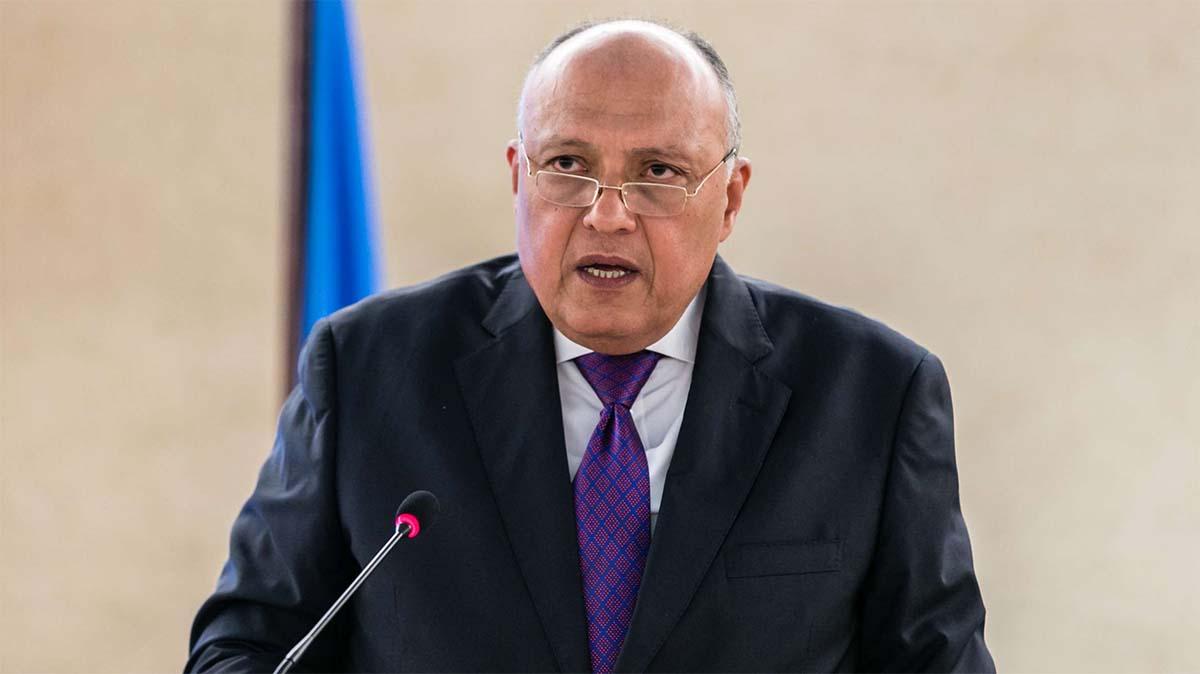Egypt’s Foreign Minister Sameh Shoukry discussed on Tuesday the recent updates in Libya with the Russian Foreign Minister Sergey Lavrov, the United Nation’s (UN) Libya envoy Ghassan Salame, and German National Security Advisor Jan Hecker, according to a ministry statement.
In sperate phone calls, Shoukry and the three officials exchanged views over the recent updates in the region, in particular, the maritime border and security and military accord that was signed almost a month ago between Turkey and Libya.
The four officials agreed to avoid any escalation in Libya or the region, and to push for a comprehensive settlement to end the Libyan crisis, including the Berlin peace process to restore the security and the stability in the region.
In the meantime, Shoukry addressed with Hecker the preparations of the Berlin conference which is expected in the new year. The Libyan peace conference is organised by Germany and the UN, aiming to achieve a ceasefire and to ensure that all parts of conflicts commit to the arms embargo.
On the other hand, Cyprus, Egypt, Greece, and France will hold a summit in the new year in Cairo, according to Greek Foreign Minister Nikos Dendias. In an interview with the Greek TV station “Alpha”, Dendias said the foreign ministers of the four countries will meet on January 4 or 5.
Egypt, Greece, and Cyprus regularly hold joint meetings in rotation to boost ties and cooperation.
The summit will follow a meeting between leaders of Israel, Cyprus, Greece in Athens on Jan. 2 to sign an agreement for the construction of EastMed pipeline. The project, which will be completed in 2025, aims to export gas from Israel to Italy and Europe.
In his interview, Dendias said the EastMed pipeline did not come as a response to Turkey activities in the Eastern Mediterranean region. He added that the EastMed pipeline will represent “an alternative energy route and will meet the needs of Europe”.
The new pipeline is expected to satisfy about 10% of the natural gas needs of the European Union, according to the Associated Press.
The details of Cairo’s summit have not been released yet. However, it is seen as a response to address the Turkish recent accord with the GNA.
In a similar context, the Head of the Libyan Presidential Council Fayez Al-Sarraj has criticised Italy’s stance on the memorandum of understanding (MoUs) signed with Turkey, saying that his country is a sovereign state and has the right to sign agreements with whatever party it chooses.
Al-Sarraj told the Italian newspaper Corriere della Sera that he was upset that the Italian Foreign Minister met with Khalifa Haftar, also criticising the visit of the Greek Foreign Minister to the Interim Government in Benghazi.
“Our capital is being destroyed and houses demolished, and our sons are being killed, so no one expects us to sit and watch this without taking action,” he explained.
Previously, Italy expressed rejection to the MoU between Turkey and Libya, as its Foreign Minister Luigi di Maio said, “it could fuel the conflict” after he visited Tripoli and Benghazi a few days ago.
Turkey triggered Mediterranean tension when it signed its MoUs for military and security cooperation and on the maritime border with Government of National Accord (GNA) on 27 November.
Egypt, Cyprus, and Greece condemned the accord. Greece expelled the Libyan ambassador for failing to send the content of the GNA and Turkey maritime and military agreements.
Turkey has been also condemned over its unauthorised drilling in the Eastern Mediterranean, while Greece emphasised its sovereignty over its maritime zones.
Earlier in November, Egyptian, Greek, and Cypriot defence ministries met in Greece and signed a document that condemned the Turkish assault in both the Cypriot exclusive economic zone (EEZ) and Syrian territories.


